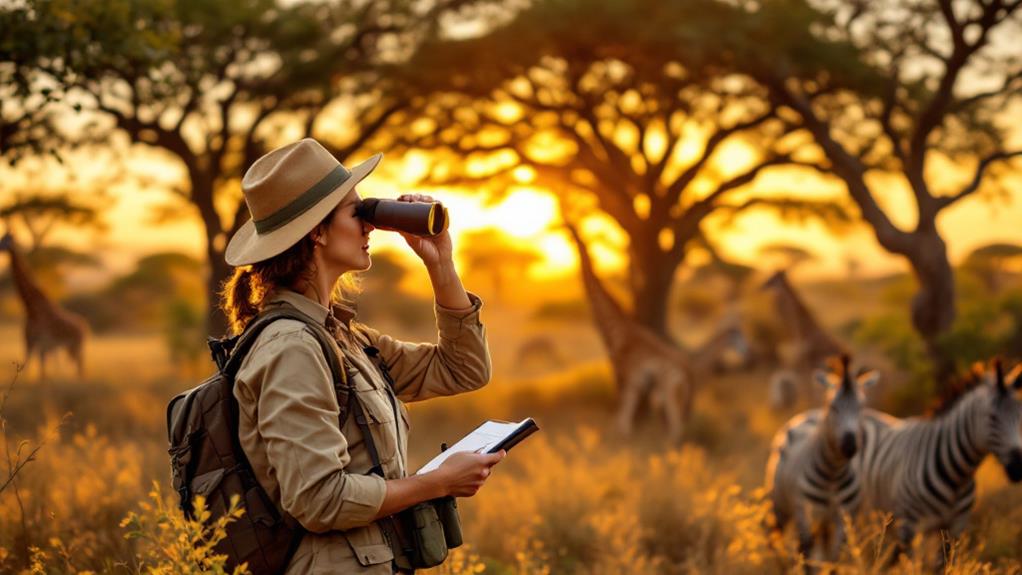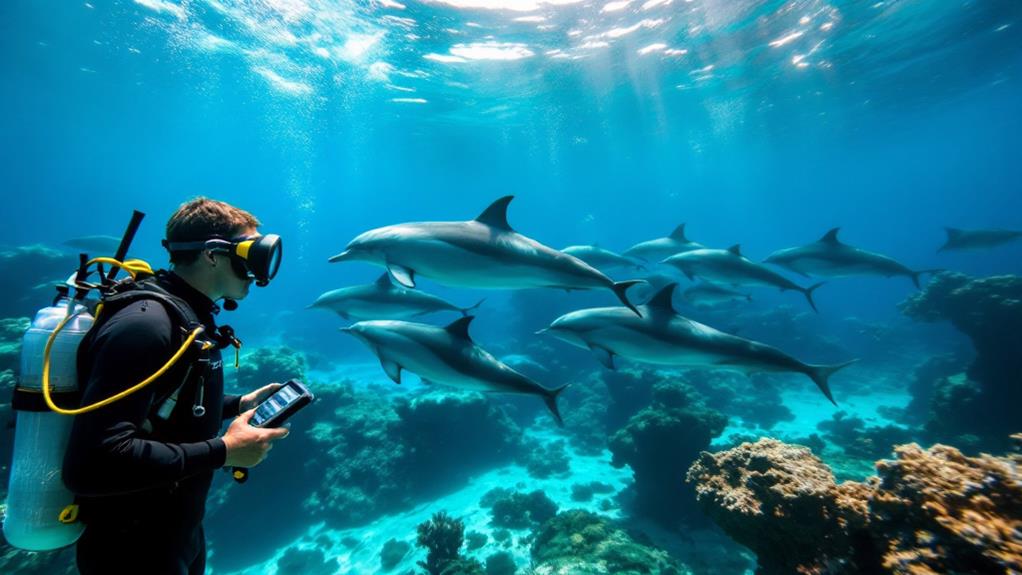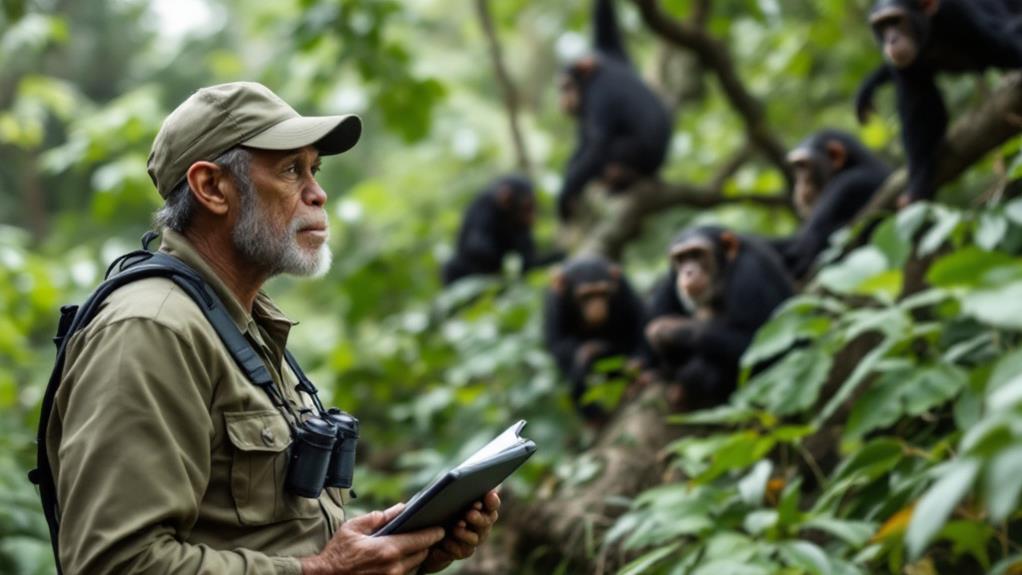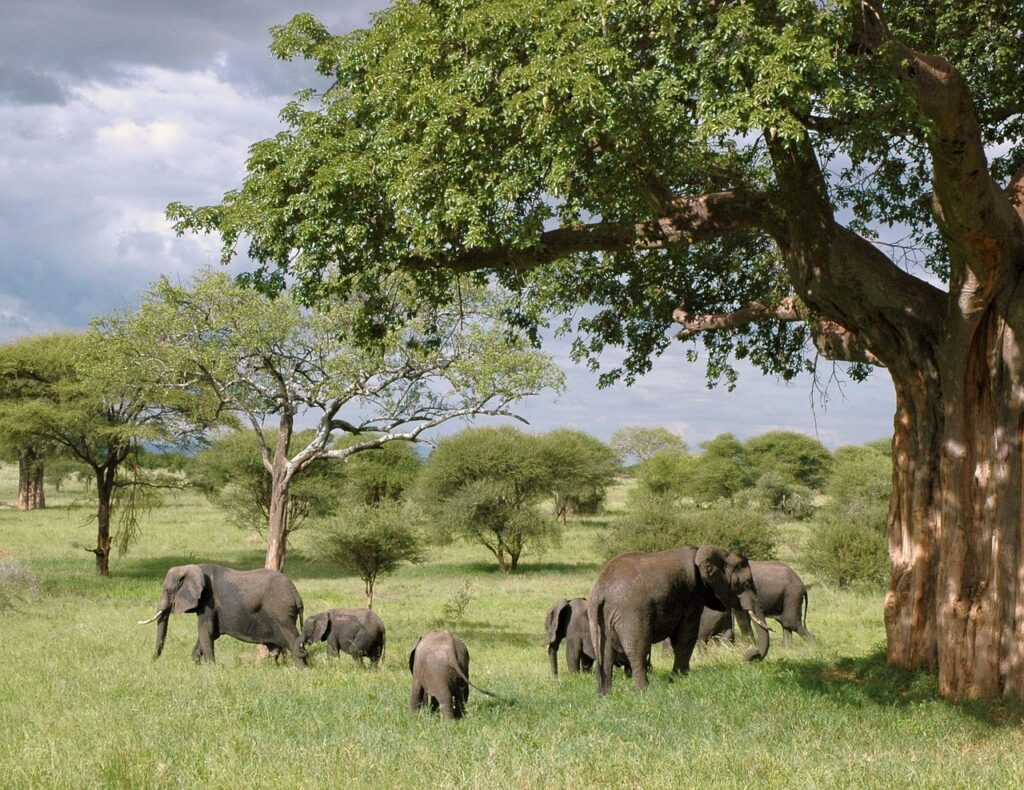Zoology career paths offer diverse opportunities for animal enthusiasts. You can become a wildlife biologist, studying animals in their natural habitats, or a zoo curator, managing animal care and exhibits. Marine mammalogists focus on aquatic species, while conservation scientists protect ecosystems. Animal behaviorists analyze species interactions, and ecologists explore environmental relationships. Veterinary zoologists combine medical expertise with zoological knowledge. As an environmental educator, you’ll inspire others about nature, or as a zookeeper, you’ll provide daily animal care. Each role contributes uniquely to animal welfare and conservation efforts. Exploring these paths further will reveal the fascinating world of zoology careers.
Wildlife Biologist

While many zoology careers focus on captive animals, wildlife biologists study animals in their natural habitats. As a wildlife biologist, you’ll work to understand animal behavior, populations, and ecosystems. You’ll conduct field research, collect data, and analyze findings to contribute to wildlife conservation efforts.
Your day-to-day tasks may include tracking animal movements, observing breeding patterns, and evaluating habitat quality. You’ll use various tools and technologies, such as GPS devices, camera traps, and DNA analysis, to gather information. You’ll also need strong analytical skills to interpret data and draw meaningful conclusions.
Wildlife biologists often specialize in particular species or ecosystems. You might focus on endangered species, marine mammals, or specific habitats like wetlands or forests. You’ll collaborate with other scientists, government agencies, and conservation organizations to develop management plans and protect wildlife populations.
To become a wildlife biologist, you’ll need at least a bachelor’s degree in zoology, wildlife biology, or a related field. Many positions require a master’s degree or Ph.D., especially for research-oriented roles. You’ll benefit from gaining practical experience through internships or volunteer work with wildlife organizations.
This career demands physical stamina and a willingness to work in challenging outdoor conditions. You may spend extended periods in remote locations, enduring harsh weather and rugged terrain. Strong communication skills are essential, as you’ll need to write reports, present findings, and educate the public about wildlife conservation.
As a wildlife biologist, you’ll play an essential role in protecting biodiversity and ensuring the long-term survival of animal species in their natural environments.
Zoo Curator
Zoo curators shift the focus from wild habitats to managed environments, overseeing animal care and exhibit design in zoological parks. As a zoo curator, you’ll be responsible for the well-being of captive animals and the educational experience of zoo visitors. Your role will involve managing animal collections, developing breeding programs, and ensuring proper nutrition and healthcare for diverse species.
You’ll need a strong background in zoology, often requiring a master’s degree or PhD in zoology, wildlife biology, or a related field. Experience in animal husbandry and zoo management is essential. You’ll collaborate with veterinarians, zookeepers, and educators to maintain high standards of animal welfare and public engagement.
Your duties will include designing and implementing species conservation plans, coordinating research projects, and participating in international breeding programs. You’ll also be responsible for creating engaging and informative exhibits that balance animal welfare with visitor experience. This involves working with architects and designers to create habitats that mimic natural environments and promote natural behaviors.
As a zoo curator, you’ll play a key role in public education and conservation efforts. You’ll develop educational programs, give presentations, and work with media to raise awareness about wildlife conservation. You’ll also manage budgets, write grant proposals, and oversee staff training and development.
The position requires excellent communication skills, leadership abilities, and a deep commitment to animal welfare and conservation. You’ll need to stay updated on the latest research and best practices in zoology and animal care. Your work will contribute markedly to species preservation and public understanding of wildlife conservation.
Marine Mammalogist

Many marine mammalogists plunge into the fascinating world of aquatic mammals, studying their behavior, physiology, and ecology. As a marine mammalogist, you’ll focus on species like whales, dolphins, seals, and sea lions, conducting research both in the field and in laboratory settings.
Your work might involve tagging and tracking marine mammals to monitor their migration patterns, collecting tissue samples for genetic analysis, or observing their social interactions. You’ll need strong swimming skills and scuba diving certifications, as you’ll often work in challenging aquatic environments.
To become a marine mammalogist, you’ll typically need a bachelor’s degree in biology, zoology, or marine science, followed by a master’s or doctoral degree specializing in marine mammalogy. You’ll develop expertise in animal anatomy, physiology, ecology, and conservation biology.
Your career options are diverse. You might work for research institutions, universities, government agencies like NOAA, or conservation organizations. Some marine mammalogists find positions at aquariums or marine parks, where they contribute to animal care and public education programs.
Field research is a significant part of the job. You’ll spend time on research vessels, conducting surveys and collecting data. You’ll also analyze this data, write scientific papers, and present your findings at conferences.
Marine mammalogists play an essential role in conservation efforts. Your research will inform policies to protect endangered species and their habitats. You’ll contribute to our understanding of how human activities, such as pollution and climate change, impact marine mammals.
Conservation Scientist
Conservation scientists take the broader view of protecting entire ecosystems and species populations. As a conservation scientist, you’ll work to maintain biodiversity and guarantee the sustainable use of natural resources. You’ll study how human activities impact wildlife and their habitats, and develop strategies to mitigate these effects.
Your work will involve conducting field research, analyzing data, and creating conservation plans. You’ll assess the health of ecosystems, monitor endangered species, and evaluate the effectiveness of conservation efforts. You may find yourself tracking animal populations, studying plant diversity, or examining soil and water quality.
In this role, you’ll collaborate with various stakeholders, including government agencies, NGOs, and local communities. You’ll need to communicate complex scientific concepts to diverse audiences and advocate for evidence-based conservation policies. You might be involved in writing grant proposals, publishing research papers, or presenting findings at conferences.
Conservation scientists often specialize in specific areas, such as wildlife management, forestry, or marine conservation. You could work in national parks, wildlife refuges, or research institutions. Some conservation scientists focus on urban ecology, finding ways to integrate nature into city planning.
To become a conservation scientist, you’ll typically need a bachelor’s degree in biology, ecology, or environmental science. Many positions require a master’s or doctoral degree, especially for research-intensive roles. You’ll benefit from developing skills in GIS mapping, statistical analysis, and data management.
This career demands a passion for nature, strong analytical abilities, and excellent problem-solving skills. You’ll face challenges like habitat loss, climate change, and competing land-use interests, but you’ll play a vital role in safeguarding our planet’s biodiversity for future generations.
Animal Behaviorist

From observing lions in the savanna to studying dolphins in the open sea, animal behaviorists dedicate their careers to understanding the complexities of animal behavior. As an animal behaviorist, you’ll investigate how animals interact with each other, their environment, and humans. Your work will involve conducting research, analyzing data, and developing theories about animal cognition, communication, and social structures.
To become an animal behaviorist, you’ll need a strong foundation in biology, psychology, and statistics. A bachelor’s degree in zoology, biology, or a related field is typically required, while many positions demand a master’s or doctoral degree. You’ll also need to develop skills in experimental design, data analysis, and scientific writing.
Your day-to-day activities will vary depending on your specific focus. You might spend time in the field observing animals in their natural habitats, designing and conducting experiments in controlled settings, or analyzing data in a laboratory. You’ll often collaborate with other scientists, veterinarians, and conservation specialists to address complex issues in animal behavior.
Animal behaviorists work in various settings, including zoos, wildlife preserves, research institutions, and universities. You might find yourself developing enrichment programs for captive animals, advising on wildlife management strategies, or teaching the next generation of zoologists.
The field of animal behavior is constantly evolving, so you’ll need to stay updated on the latest research and technologies. You’ll have the opportunity to contribute to our understanding of animal cognition, ecology, and conservation, potentially influencing policies and practices that affect animal welfare and environmental protection.
Ecologist
Ecosystems are the intricate tapestries of life that ecologists dedicate their careers to understanding. As an ecologist, you’ll study the complex relationships between organisms and their environment, examining how living things interact with each other and their surroundings. Your work will involve investigating the delicate balance of nature and how various factors, including human activities, impact ecosystems.
In this role, you’ll conduct field research, collect data, and analyze environmental samples. You might find yourself tracking animal populations, measuring plant growth, or evaluating water quality. You’ll use advanced technology and statistical methods to interpret your findings and draw conclusions about ecosystem health and functioning.
Ecologists often specialize in specific areas, such as marine ecology, forest ecology, or conservation ecology. You could focus on particular species, habitats, or ecological processes. Your expertise will be vital in addressing environmental challenges like climate change, habitat loss, and species extinction.
As an ecologist, you’ll collaborate with other scientists, policymakers, and community stakeholders to develop conservation strategies and sustainable management practices. You might work for government agencies, environmental consulting firms, research institutions, or non-profit organizations.
To become an ecologist, you’ll need a strong foundation in biology, chemistry, and mathematics. A bachelor’s degree in ecology or a related field is essential, while many positions require a master’s or doctoral degree. You’ll also need excellent analytical, problem-solving, and communication skills to succeed in this field.
Your work as an ecologist will contribute to our understanding of the natural world and help shape policies that protect and preserve Earth’s diverse ecosystems for future generations.
Veterinary Zoologist
Veterinary zoologists bridge the gap between animal health and wildlife conservation. As a veterinary zoologist, you’ll combine your expertise in veterinary medicine with a deep understanding of zoology to care for wild and exotic animals. Your work will be essential in maintaining the health of individual animals and entire populations, both in captivity and in their natural habitats.
In this role, you’ll diagnose and treat illnesses, perform surgeries, and develop preventive health programs for a wide variety of species. You might find yourself working in zoos, wildlife rehabilitation centers, or even in the field with conservation organizations. Your responsibilities will include conducting health assessments, administering vaccinations, and managing breeding programs to support endangered species recovery efforts.
You’ll need to complete a Doctor of Veterinary Medicine (DVM) degree and obtain additional specialized training in zoological medicine. This career demands a strong foundation in biology, anatomy, and physiology, as well as excellent problem-solving skills and the ability to adapt to diverse environments.
As a veterinary zoologist, you’ll collaborate with other professionals such as wildlife biologists, conservationists, and animal behaviorists. You’ll contribute to research on animal diseases, nutrition, and habitat management. Your expertise will be valuable in addressing emerging threats to wildlife, including zoonotic diseases and the impacts of climate change on animal populations.
This career offers unique opportunities to make a significant impact on animal welfare and conservation efforts. You’ll face challenges such as working with potentially dangerous animals and dealing with limited resources in remote locations. However, the rewards of protecting and preserving wildlife make this an incredibly fulfilling career path for those passionate about animal health and conservation.
Environmental Educator
Inspiring the next generation of environmental stewards is at the heart of an environmental educator’s role. As an environmental educator with a background in zoology, you’ll combine your knowledge of animals and ecosystems with effective teaching strategies to engage diverse audiences. You’ll work in various settings, including schools, nature centers, zoos, and parks, to create and deliver programs that foster an understanding of wildlife and conservation.
Your responsibilities will include developing curriculum materials, leading guided nature walks, and organizing hands-on activities that demonstrate ecological concepts. You’ll need to adapt your teaching style to suit different age groups and learning abilities, from young children to adults. You’ll also stay up-to-date on current environmental issues and research to provide accurate, relevant information to your audience.
In this role, you’ll often collaborate with other professionals, such as biologists, park rangers, and teachers, to create thorough educational experiences. You may also be involved in community outreach programs, organizing events like wildlife festivals or conservation workshops.
To succeed as an environmental educator, you’ll need excellent communication skills, creativity, and patience. You should be comfortable speaking in public and handling live animals for demonstrations. A passion for nature and a desire to make a positive impact on the environment are essential.
This career offers the opportunity to work outdoors, engage with diverse communities, and contribute to conservation efforts. You’ll play a significant role in raising awareness about environmental issues and inspiring others to take action in protecting our planet’s biodiversity.
Zookeeper
Working as a zookeeper is a hands-on career path that puts you at the forefront of animal care and conservation. In this role, you’ll be responsible for the daily care and well-being of various animals in a zoo or wildlife facility. Your duties will include feeding, cleaning enclosures, monitoring health, and providing enrichment activities to stimulate the animals’ natural behaviors.
As a zookeeper, you’ll need a strong educational background in zoology, animal science, or a related field. Most positions require at least a bachelor’s degree, and some may prefer candidates with advanced degrees or specialized certifications. You’ll also need excellent observational skills, physical stamina, and the ability to work in all weather conditions.
Your day-to-day tasks will vary depending on the animals you’re caring for. You might prepare specialized diets, administer medications, train animals for medical procedures, or assist with breeding programs. You’ll also play an essential role in public education by giving presentations and answering visitors’ questions about the animals in your care.
Safety is paramount in this profession. You’ll need to follow strict protocols to protect yourself, your colleagues, and the animals. This includes proper handling techniques, maintaining secure enclosures, and being vigilant for signs of illness or distress.
Career advancement opportunities include specializing in specific animal groups, moving into management roles, or changing to research or conservation projects. As a zookeeper, you’ll contribute to important conservation efforts and help raise public awareness about endangered species and habitat protection.

Erzsebet Frey (Eli Frey) is an ecologist and online entrepreneur with a Master of Science in Ecology from the University of Belgrade. Originally from Serbia, she has lived in Sri Lanka since 2017. Eli has worked internationally in countries like Oman, Brazil, Germany, and Sri Lanka. In 2018, she expanded into SEO and blogging, completing courses from UC Davis and Edinburgh. Eli has founded multiple websites focused on biology, ecology, environmental science, sustainable and simple living, and outdoor activities. She enjoys creating nature and simple living videos on YouTube and participates in speleology, diving, and hiking.

